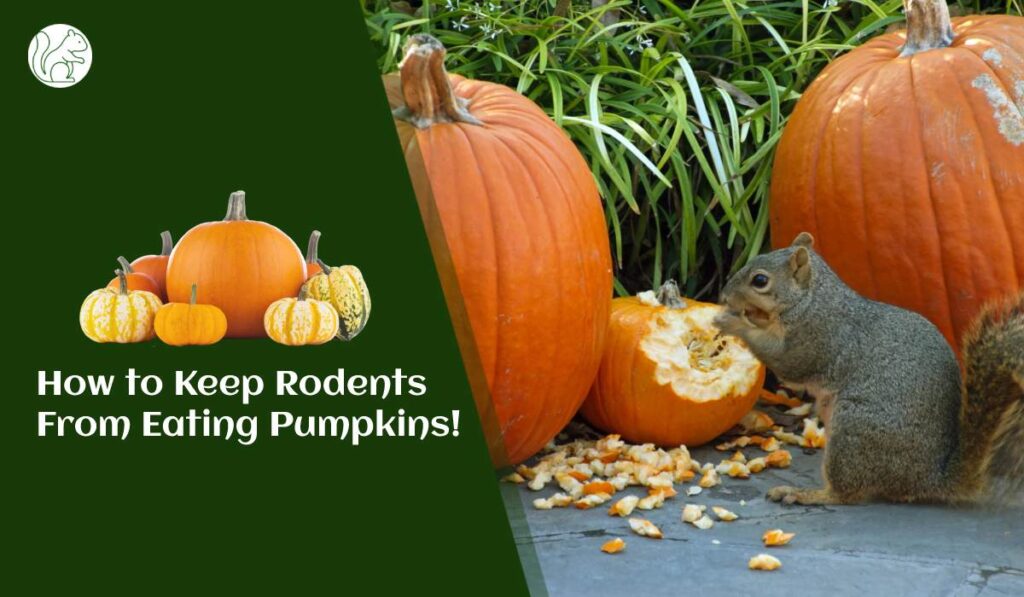If you’re tired of losing your pumpkins to pesky rodents, you’ve come to the right place. In this comprehensive guide, we will walk you through practical steps and proven strategies on how to keep rodents from eating pumpkins. By the end of this article, you will be armed with all the knowledge you need to safeguard your pumpkin patch and enjoy a bountiful harvest.

Recognize the Culprits: Who’s Eating Your Pumpkins?
Before you can implement effective strategies to keep rodents away from your pumpkins, it’s crucial to identify the culprits. In most cases, the main offenders are mice, rats, and squirrels. Each of these rodents has distinctive signs of infestation. Mice and rats often leave small, circular bite marks, while squirrels will typically gouge out larger chunks.
Understanding Rodents: Why Do They Love Pumpkins?
Pumpkins are a delicious treat for rodents. They provide a rich source of food, especially in the fall when other resources might be scarce. The sweet flesh of the pumpkin and its seeds are a significant attraction for these critters. By understanding this, you can devise effective strategies to deter them.
1. Use Natural Rodent Repellents
Natural repellents are an excellent way to keep rodents from eating your pumpkins without causing harm to the environment or the critters. Some natural repellents include:
- Peppermint oil: Rodents dislike the strong scent of peppermint. Sprinkle some peppermint oil around your pumpkins to deter them.
- Hot peppers: The capsaicin in hot peppers is a powerful deterrent for rodents. Sprinkle ground hot peppers around your pumpkin patch to ward off these pests.
2. Create a Physical Barrier
A physical barrier can effectively prevent rodents from reaching your pumpkins. Here are some options:
- Fencing: Install a wire mesh fence around your pumpkin patch. Make sure it’s deep enough to prevent burrowing.
- Netting: Cover your pumpkins with a net or use a cloche to protect individual pumpkins.
3. Use Rodent Traps
Trapping is another effective method to protect your pumpkins from rodents. However, it’s crucial to use humane traps and relocate the rodents far from your property.
4. Grow Rodent-Resistant Varieties
Some pumpkin varieties are less appealing to rodents. Consider growing these varieties to reduce the allure of your pumpkin patch.
5. Keep the Area Clean
Maintaining a clean and tidy garden is a great way to discourage rodents. Remove any fallen fruits and debris regularly to make your pumpkin patch less attractive to them.
6. Introduce Natural Predators
Natural predators, like cats, dogs, or owls, can significantly reduce the rodent population in your area. Consider installing owl boxes to attract these natural predators.
7. Use Commercial Repellents
Commercial rodent repellents are available in most gardening stores. They can provide an extra layer of protection for your pumpkins.
8. Rotate Your Crops
Crop rotation is a sound agricultural practice that can also deter rodents. By rotating your crops each year, you reduce the chances of a rodent infestation.
9. Use Noise and Light Deterrents
Rodents are nocturnal and generally dislike bright lights and loud noises. Install motion-activated lights or noise machines to scare them away.
10. Seek Professional Help
If all else fails, consider hiring a professional pest control service. They have the experience and tools to handle a severe rodent infestation effectively.
Conclusion
Protecting your pumpkin patch from rodents can be a challenging task, but it’s far from impossible. With the right strategies in place, you can safeguard your pumpkins and enjoy the fruits of your labor. Remember, it’s all about creating an unappealing environment for these critters and taking proactive steps to deter them.
From using natural repellents such as peppermint oil and hot peppers, to installing physical barriers like fencing and netting, your options are vast and varied. If the infestation is severe, don’t hesitate to use commercial repellents or seek professional help.
Keep in mind that maintaining a clean and tidy garden can significantly reduce the attractiveness of your pumpkin patch to rodents. Introducing natural predators and rotating your crops are also effective strategies worth considering.
Every garden and situation is unique. So, feel free to experiment with these strategies, find what works best for you, and adapt accordingly. Remember, the goal is not to eliminate rodents entirely – as they play an important role in our ecosystem – but to strike a balance that allows both you and them to coexist harmoniously.
Now that you have the knowledge and tools, it’s time to reclaim your pumpkin patch from these pesky rodents. Armed with these tips and strategies, you’re ready to protect your pumpkins and ensure a bountiful harvest. Happy gardening!
